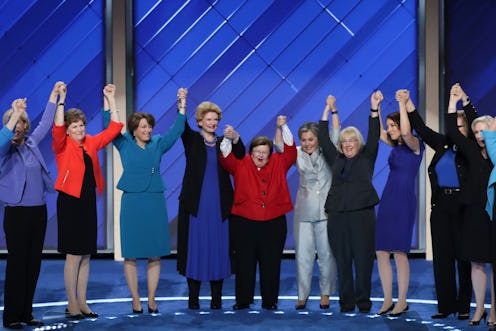News
The DNC Featured 12 Powerful Senators
The last night of the Democratic National Convention featured Sen. Barbara Mikulski, along with a group dubbed “the Democratic women of the Senate.” But who are the Democratic women of the Senate? The group on stage featured a lot of powerful politicians, but it didn't actually include every female Democratic senator.
The stage featured Democratic Sens. Debbie Stabenow, Maria Cantwell, Patty Murray, Barbara Mikulski — who’s been in the Senate longer than any other woman — Claire McCaskill, Kirsten Gillibrand, Barbara Boxer, Mazie Hirono, Elizabeth Warren, Tammy Baldwin, Amy Klobuchar, and Jeanne Shaheen. But that’s only 12 people, and there are 14 Democrats in the Senate who are women. Sens. Heidi Heitkamp and Dianne Feinstein were absent from the stage on Wednesday night.
Most of the women who appeared on stage had served with Hillary Clinton in the Senate, and they testified to her competence and responsiveness as a senator. “For 15 years, a printing manufacturer in my state struggled with a foreign trade dispute,” Shaheen said during her segment. “The costs to the company were so high, they threatened hundreds of jobs. At Hillary Clinton's confirmation hearing, I brought the issue to her attention. She promised to look into it. Within 90 days, the issue was resolved.”
Some of the women on stage weren’t in the Senate at the same time as Clinton, and so they spoke more generally of her virtues and, of course, Donald Trump’s deficiencies.
“Hillary Clinton knows how to fight back against dangerous, loud-mouthed bullies,” Warren said. “For 25 years, she's been on the receiving end of one attack after another. But she doesn't back down. She doesn't whine. She doesn't run to Twitter to give people nasty nicknames. And she sure as heck doesn't quit.”
In late 2015, every single female Democratic senator endorsed Clinton for president in the primaries — except for Warren. The Massachusetts senator didn’t endorse anybody in the Democratic primary, even though, from an ideological standpoint, she’s clearly much more aligned with Bernie Sanders than Clinton. Warren might have stood on the sidelines, in part, because Clinton was always the heavy favorite to win the primary, and it’s generally not a smart political move to make an enemy out of the party’s standard bearer. She did, eventually, endorse Clinton after the primaries, and has spoken on her behalf several times.
The Democratic women of the Senate segment was likely an attempt to both highlight the historic nature of Clinton’s candidacy and depict Democrats as the pro-woman party. And neither of those are terribly difficult sells.
